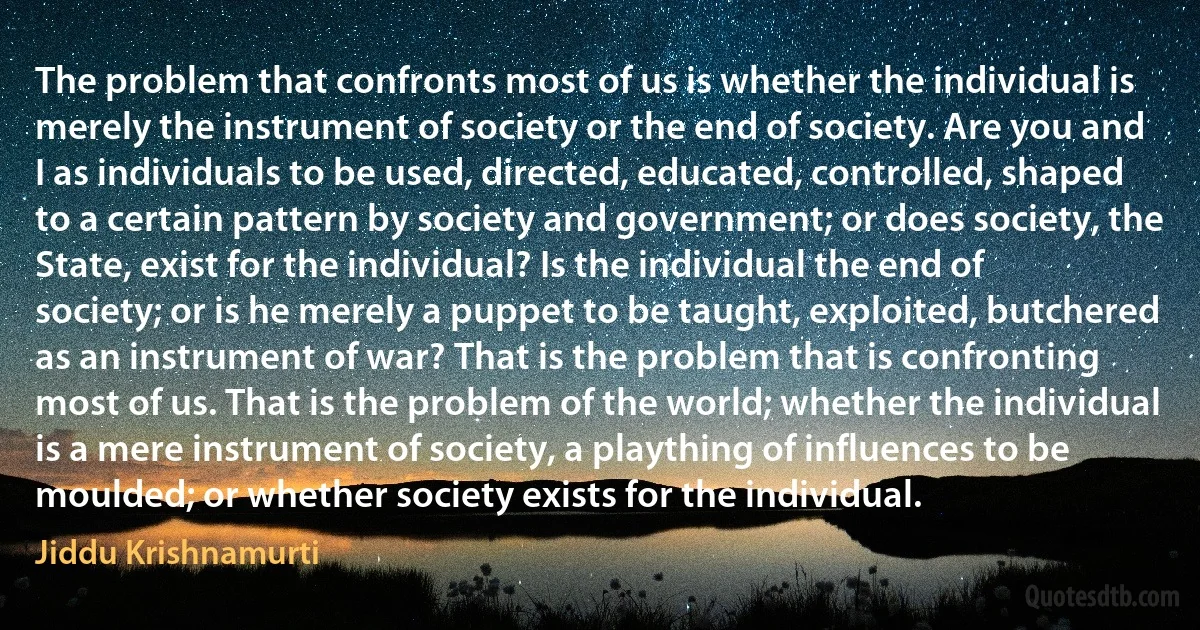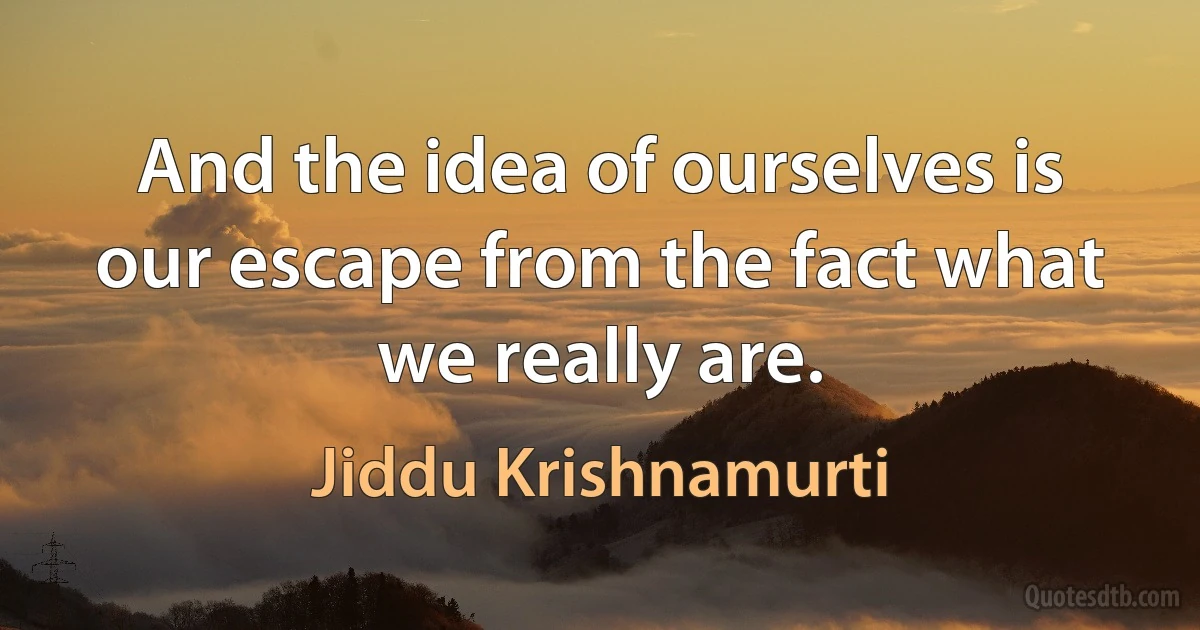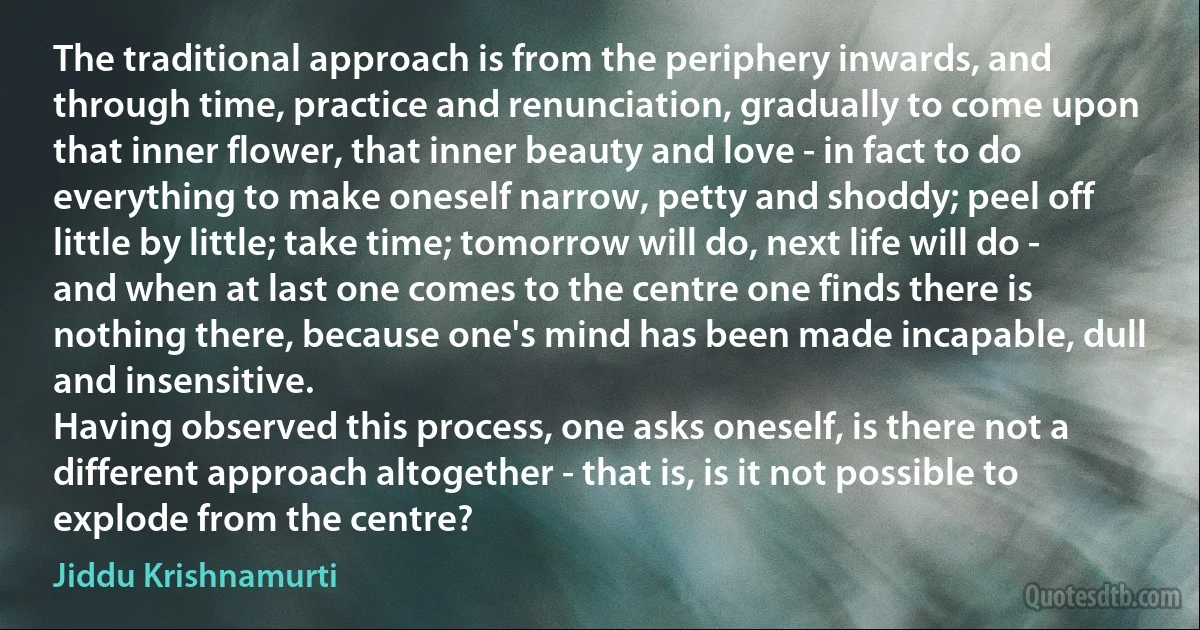Jiddu Krishnamurti quotes - page 5
In this constant battle which we call living, we try to set a code of conduct according to the society in which we are brought up, whether it be a Communist society or a so-called free society; we accept a standard of behaviour as part of our tradition as Hindus or Muslims or Christians or whatever we happen to be. We look to someone to tell us what is right or wrong behaviour, what is right or wrong thought, and in following this pattern our conduct and our thinking become mechanical, our responses automatic. We can observe this very easily in ourselves.

Jiddu Krishnamurti
Surely, the violence and the entity who says, "I must change violence into non-violence", are both the same. To recognize that fact is to put an end to all conflict, is it not? There is no longer the conflict of trying to change, because I see that the very movement of the mind not to be violent is itself the outcome of violence.
So, the questioner wants to know why it is that he cannot go beyond all these superficial wrangles of the mind. For the simple reason that, consciously or unconsciously, the mind is always seeking something, and that very search brings violence, competition, the sense of utter dissatisfaction. It is only when the mind is completely still that there is a possibility of touching the deep waters.

Jiddu Krishnamurti
There are many for whom the Qualification of Desirelessness is a difficult one, for they feel that they are their desires - that if their distinctive desires, their likings and dislikings, are taken away from them, there will be no self left. But these are only they who have not seen the Master; in the light of His holy Presence all desire dies, but the desire to be like Him.

Jiddu Krishnamurti
Throughout theological history we have been assured by religious leaders that if we perform certain rituals, repeat certain prayers or mantras, conform to certain patterns, suppress our desires, control our thoughts, sublimate our passions, limit our appetites and refrain from sexual indulgence, we shall, after sufficient torture of the mind and body, find something beyond this little life. And that is what millions of so-called religious people have done through the ages, either in isolation, going off into the desert or into the mountains or a cave or wandering from village to village with a begging bowl, or, in a group, joining a monastery, forcing their minds to conform to an established pattern. But a tortured mind, a broken mind, a mind which wants to escape from all turmoil, which has denied the outer world and been made dull through discipline and conformity - such a mind, however long it seeks, will find only according to its own distortion.

Jiddu Krishnamurti
Passion is something which very few of us have really felt. What we may have felt is enthusiasm, which is being caught up in an emotional state over something. Our passion is for something: for music, for painting, for literature, for a country, for a woman or a man; it is always the effect of a cause. When you fall in love with someone, you are in a great state of emotion, which is the effect of that particular cause; and what I am talking about is passion without a cause. It is to be passionate about everything, not just about something, whereas most of us are passionate about a particular person or thing. I think one must see this distinction very clearly. In the state of passion without a cause, there is intensity free of all attachment; but when passion has a cause, there is attachment, and attachment is the beginning of sorrow.

Jiddu Krishnamurti
When man becomes aware of the movement of his own thoughts, he will see the division between the thinker and thought, the observer and the observed, the experiencer and the experience. He will discover that this division is an illusion. Then only is there pure observation which is insight without any shadow of the past or of time. This timeless insight brings about a deep, radical mutation in the mind.

Jiddu Krishnamurti
Sacredness is the essence of religion. You know, a great river may become polluted as it flows past a town, but if the pollution isn't too great, the river cleanses itself as it goes along, and within a few miles it is again clean, fresh, pure. Similarly, when once the mind comes upon this sacredness, then every act is a cleansing act. Through its very movement the mind is making itself innocent, and therefore it is not accumulating. A mind that has discovered this sacredness is in constant revolution - not economic or social revolution, but an inner revolution through which it is endlessly purifying itself. Its action is not based on some idea or formula. As the river, with a tremendous volume of water behind it, cleanses itself as it flows, so does the mind cleanse itself when once it has come upon this religious sacredness.

Jiddu Krishnamurti



